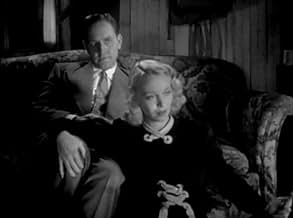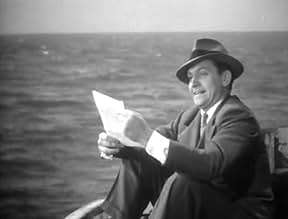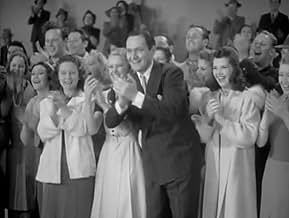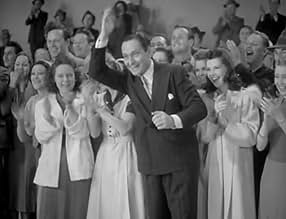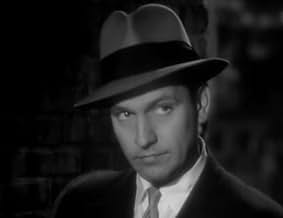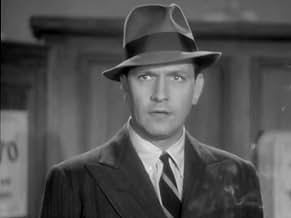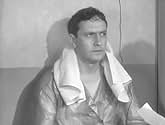VALUTAZIONE IMDb
6,5/10
707
LA TUA VALUTAZIONE
Aggiungi una trama nella tua linguaA young heiress runs away from her overprotective grandfather. Penniless on the streets of New York, she manages to find employment, but a reporter knows her true identity.A young heiress runs away from her overprotective grandfather. Penniless on the streets of New York, she manages to find employment, but a reporter knows her true identity.A young heiress runs away from her overprotective grandfather. Penniless on the streets of New York, she manages to find employment, but a reporter knows her true identity.
- Regia
- Sceneggiatura
- Star
- Candidato a 1 Oscar
- 1 candidatura in totale
Syd Saylor
- Robinson
- (as Sid Saylor)
Ernie Adams
- Cafe Counterman
- (non citato nei titoli originali)
Ralph Brooks
- Cafe Customer
- (non citato nei titoli originali)
Horace G. Brown
- Ice Skater
- (non citato nei titoli originali)
George Burton
- Drayman
- (non citato nei titoli originali)
Recensioni in evidenza
I think I liked this movie despite the rather formulaic and ridiculous plot because both Viginia Bruce and Frederic March did such a wonderful job with this romantic comedy from Hal Roach Productions.
Virginia is the grand-daughter of a very wealthy but extremely overprotective man. He won't let her go anywhere without him and sees danger around every corner. As a result, she is smothered and bored--aching to live a real life. She escapes and establishes a new identity as a regular working girl. However, reporter Frederic March finds out about the ruse and wants to exploit the woman for a buck. However, once they meet, sparks begin to fly and he is torn between riches and his new love.
You know about where the movie will end--after all, it's a formulaic romantic comedy from an era when the movies never dared stray from the expected course. However, how delicately and believably the stars follow this formula is what makes this film so worth watching. A cute and satisfying little film.
By the way, at the very end there is a cute little cameo by the silent screen star Harry Langdon as the preacher. While his best years in movies were long behind him, he did continue to do small roles in a variety of films over the years.
Virginia is the grand-daughter of a very wealthy but extremely overprotective man. He won't let her go anywhere without him and sees danger around every corner. As a result, she is smothered and bored--aching to live a real life. She escapes and establishes a new identity as a regular working girl. However, reporter Frederic March finds out about the ruse and wants to exploit the woman for a buck. However, once they meet, sparks begin to fly and he is torn between riches and his new love.
You know about where the movie will end--after all, it's a formulaic romantic comedy from an era when the movies never dared stray from the expected course. However, how delicately and believably the stars follow this formula is what makes this film so worth watching. A cute and satisfying little film.
By the way, at the very end there is a cute little cameo by the silent screen star Harry Langdon as the preacher. While his best years in movies were long behind him, he did continue to do small roles in a variety of films over the years.
This movie was charming. I hadn't noticed Virginia Bruce before this movie and found that she was so appealing. Bruce runs away from grand dad to experience an "ordinary" life of less privilege. She winds up befriended by Patsy Kelly who takes her under her wing finding her a job at a department store. Bruce delightfully plays the part of the runaway heiress turned salesgirl. She meets up with a reporter, Fredric March who discovers that she is the missing heiress. The rest is played out with misconceptions and misunderstandings; the stuff that romance movies thrive on. I just saw her in "Flight Angels" with one of my favorites, Dennis Morgan and I was so happy to see her. It was like seeing an old friend. I am looking forward to discovering more of her movies.
HEART is an attempt at a screwball comedy that fails for a couple of reasons: a plot that gets too entangled, to the point of incredulity, and a lead actress who may look a little like Carol Lombard, but clearly isn't. Virginia Bruce is the female in question as a runaway heiress who ends up working incognito in her grandfather's department store, clearly meant to resemble Macy's. The thin-faced Bruce is a bit too wistful for the role, unfortunately. The role really could have used Lombard -- or Thelma Todd or Irene Dunne or Katherine Hepburn or Claudette Colbert, or even one of the Bennett sisters. Frederic March is, as always, note-perfect as a cynical reporter on Bruce's trail who -- what else? -- ends up falling for her. There is a stunt-filled ice skating sequence that takes up a bit too much time, compounded by a very rushed ending that leaves major plot strings untied. The wonderful Eugene Palette is on hand as March's blustery editor, and wisecracking Patsy Kelly is in fine form as a downtrodden store clerk who takes Bruce in. This may be no BRINGING UP BABY or NOTHING SACRED or IT HAPPENED ONE NIGHT, but it is fun to watch March, Kelly and Palette in action. And it is also viewable in its historic context, surrounded as it was by several masterpieces of the genre.
Broadly played and directed semi-screwball outing has charming Fredric March cast as a newspaper reporter assigned to locate a wealthy, beautiful young heiress, who has ditched her fancy surroundings for a regular life in New York City. Grounded, natural Virgina Bruce was a good choice for the rich kid, who ends up working in the department store her family owns, and Patsy Kelly is wonderfully brash as the salesgirl who unknowingly takes her in. The supporting characters are made up of wacky, genial crazies, and the actors have been encouraged to play them to the hilt, resulting in some overcooked comedy which may strike one as either funny or far too silly. There are some classic bits: the ice-skating sequence where March and Bruce end up in a game of Musical Chairs, an unbilled Marjorie Main as a plain-spoken customer in the store, and Kelly's solution to the power going out just before a fancy dinner in her apartment. The script, by Jack Jevne and Eddie Moran (from a story by Ed Sullivan!), was criticized at the time for being too close to "It Happened One Night", but it's actually far less ambitious. The plot set-up is one-half merry mix-up and the other half romantic nuttiness, and many of the lines have a punch-drunk giddiness which is very sweet. **1/2 from ****
Though the gimmick of the runaway heiress was beginning to wear thin by 1938, There Goes My Heart still is entertaining enough with a sparkling cast going through it's usual paces.
Virginia Bruce is our heiress in this one and reprising his role of hard hitting reporter from Nothing Sacred is Fredric March. Two leads of this magnitude is not usual for the Hal Roach studio which normally was doing two and three reel comedies. But even though this is recycled material it still is served up rather nicely. Best scene for March and Bruce is at the skating rink playing musical chairs on roller skates. March is good, but this was the kind of material Cary Grant would have relished.
Hal Roach did give his director Norman McLeod a fabulous supporting cast to work with all going through their various screen images that we love. Best in the group is Patsy Kelly playing the shop-girl who happens to work in Bruce's grandfather's department store and who takes in Bruce not knowing who she is and gets her job at the store. Nancy Carroll the former silent screen star is a jealous co-worker and Irving Bacon is the sexually harassing supervisor.
Others in this incredibly good cast are Claude Gillingwater as Bruce's tycoon grandfather, Eugene Palette as March's editor, Arthur Lake as March's friend and newspaper photographer and Alan Mowbray as Kelly's boyfriend studying to be a chiropractor. Yes, Alan Mowbray and Patsy Kelly as a couple. Until i saw this film I never would have believed them as a screen team. Patsy's best moments are demonstrating an exercise machine at the store. You should also see newly hired sales person Virginia Bruce waiting on Marjorie Main.
At the very end of the film, former silent screen comic star Harry Langdon plays a minister. At this point in his career, Langdon was accepting any kind of work and part he could get. Nothing especially hilarious about his performance, it's too brief and he's surrounded by too many other high caliber performers in this cast to shine in any way.
It's not one of Fredric March's best films, but it's still amusing enough and the ensemble can't be beat.
Virginia Bruce is our heiress in this one and reprising his role of hard hitting reporter from Nothing Sacred is Fredric March. Two leads of this magnitude is not usual for the Hal Roach studio which normally was doing two and three reel comedies. But even though this is recycled material it still is served up rather nicely. Best scene for March and Bruce is at the skating rink playing musical chairs on roller skates. March is good, but this was the kind of material Cary Grant would have relished.
Hal Roach did give his director Norman McLeod a fabulous supporting cast to work with all going through their various screen images that we love. Best in the group is Patsy Kelly playing the shop-girl who happens to work in Bruce's grandfather's department store and who takes in Bruce not knowing who she is and gets her job at the store. Nancy Carroll the former silent screen star is a jealous co-worker and Irving Bacon is the sexually harassing supervisor.
Others in this incredibly good cast are Claude Gillingwater as Bruce's tycoon grandfather, Eugene Palette as March's editor, Arthur Lake as March's friend and newspaper photographer and Alan Mowbray as Kelly's boyfriend studying to be a chiropractor. Yes, Alan Mowbray and Patsy Kelly as a couple. Until i saw this film I never would have believed them as a screen team. Patsy's best moments are demonstrating an exercise machine at the store. You should also see newly hired sales person Virginia Bruce waiting on Marjorie Main.
At the very end of the film, former silent screen comic star Harry Langdon plays a minister. At this point in his career, Langdon was accepting any kind of work and part he could get. Nothing especially hilarious about his performance, it's too brief and he's surrounded by too many other high caliber performers in this cast to shine in any way.
It's not one of Fredric March's best films, but it's still amusing enough and the ensemble can't be beat.
Lo sapevi?
- QuizAccording to a New York Times article on 16 October 1938, the Citizen's Chiropractic Committee of New York State sued the film producers, authors and Alan Mowbray for $100,000 claiming damages to the profession. One doctor was very upset that the film implied it was possible to go through a chiropractic school through a correspondence course. The outcome of the suit is not known.
- Citazioni
Peggy O'Brien: Just think, someday i'll be Mrs. Doctor Pennypepper E. Pennypepper... then I'll find out what the E. stands for!
- Curiosità sui creditiThe opening credits are shown as if viewed through a ship's porthole with waves erasing each set of credits.
- Colonne sonoreA Life on the Ocean Wave
(1838) (uncredited)
Music by Henry Russell
Lyrics by Epes Sargent
Sung a cappella by Fredric March
I più visti
Accedi per valutare e creare un elenco di titoli salvati per ottenere consigli personalizzati
Dettagli
- Data di uscita
- Paese di origine
- Lingua
- Celebre anche come
- There Goes My Heart
- Luoghi delle riprese
- Azienda produttrice
- Vedi altri crediti dell’azienda su IMDbPro
- Tempo di esecuzione
- 1h 23min(83 min)
- Colore
- Proporzioni
- 1.37 : 1
Contribuisci a questa pagina
Suggerisci una modifica o aggiungi i contenuti mancanti

